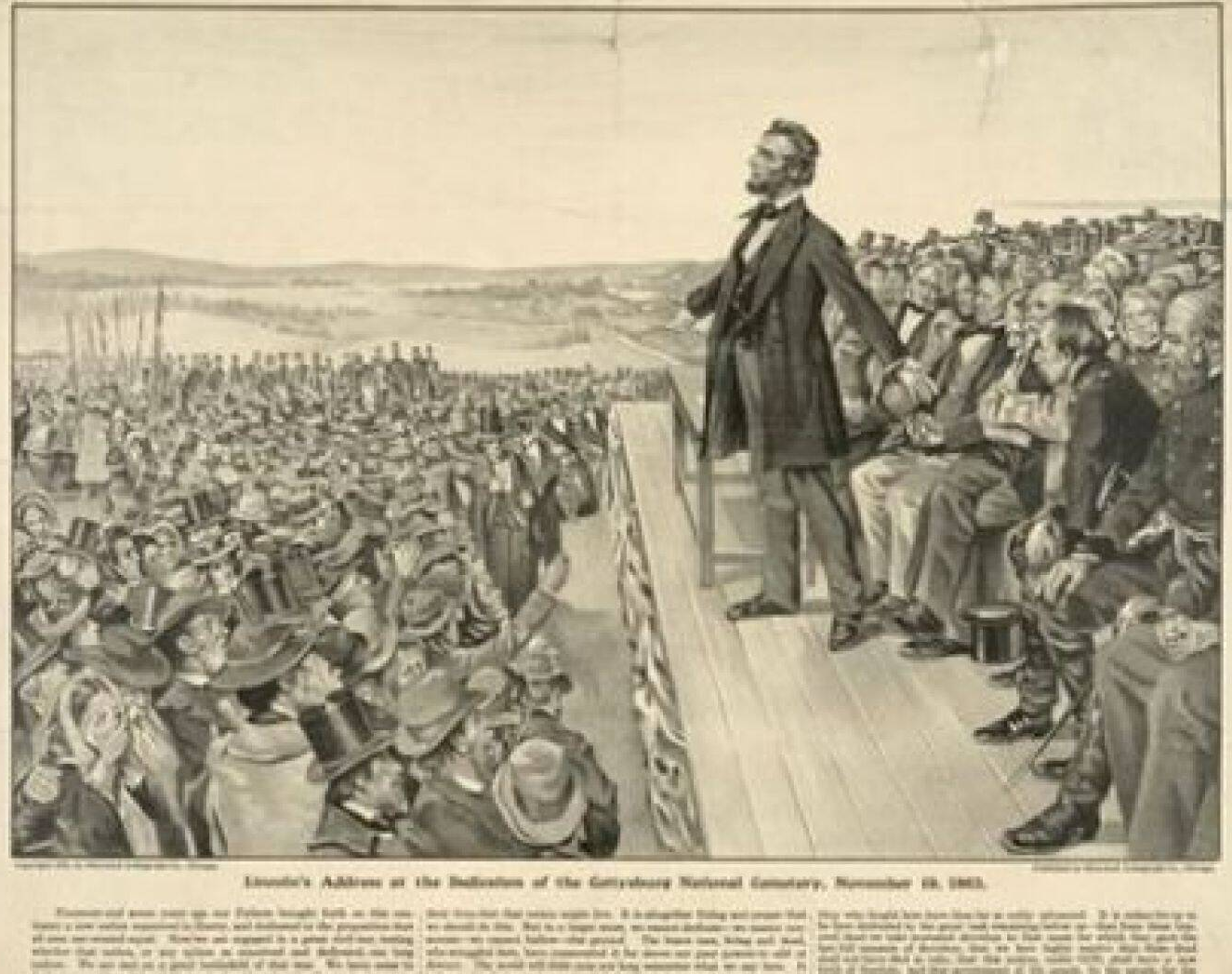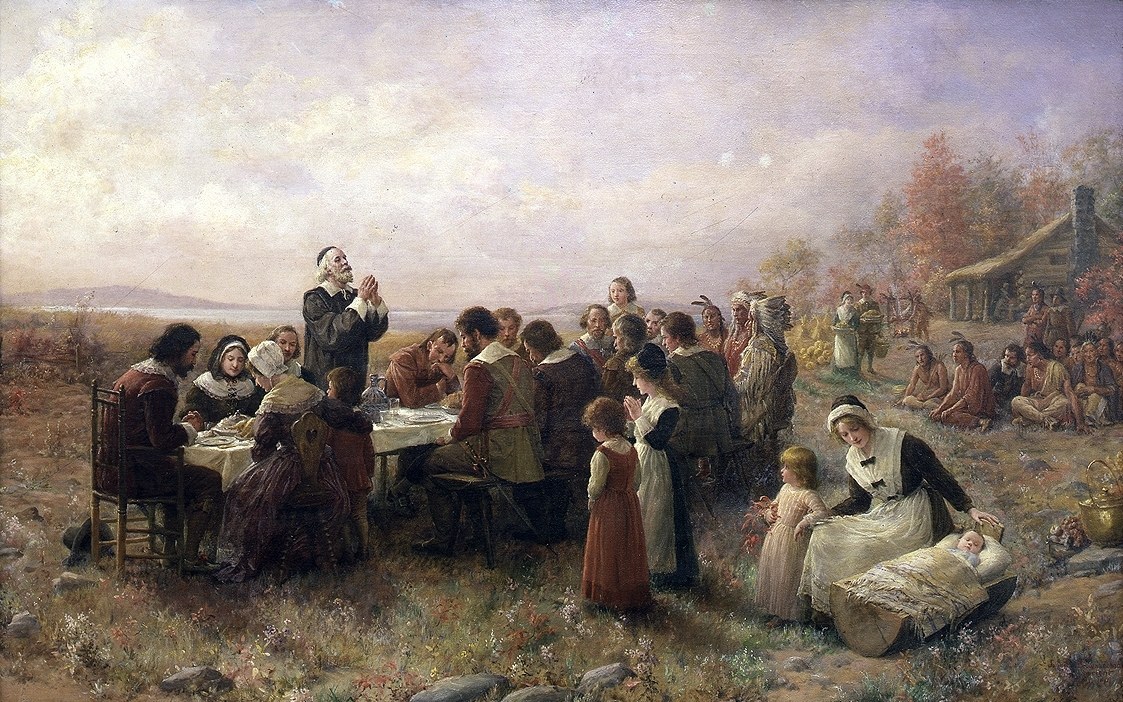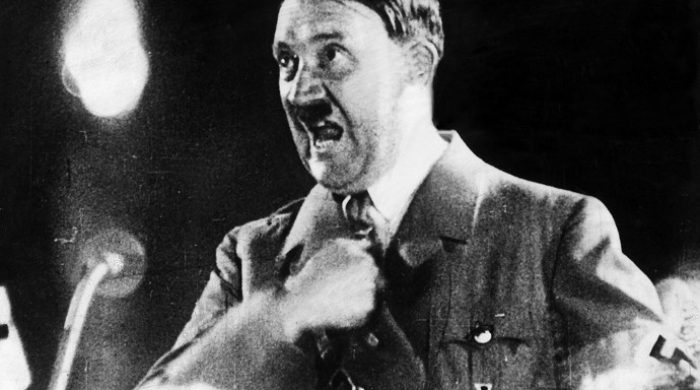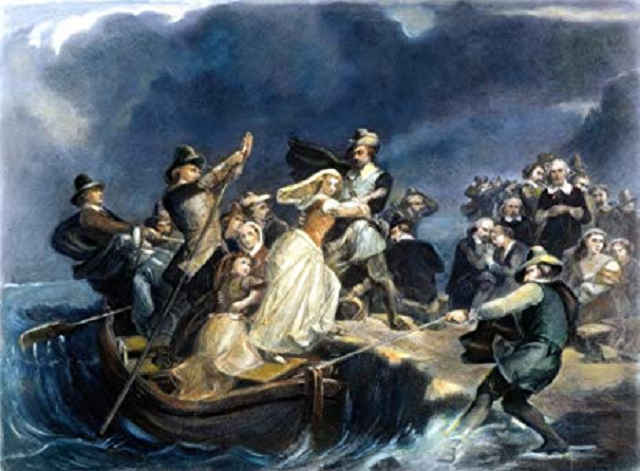Thanksgiving in America: A Pause in Our (Un)Civil War
 Thanksgiving in America 2019: a one-day truce in the battle for the White House, the impeachment effort, the bitter partisan divide, and the war on religious liberty.I wrote an early post on These Stone Walls back in what now seems an ancient time. The year was 2010, and the post in question was “Holidays in the Hoosegow: Thanksgiving with Some Not-So-Just Desserts.” I got part of the title - the word “Hoosegow” - from Walter Brennan, a three-time Academy Award winning character actor who grew up in my neighborhood on the North Shore of Boston. He starred with John Wayne, Dean Martin and Ricky Nelson in one of my favorite Westerns, Rio Bravo (1959). He referred to the local jail as the “Hoosegow,” from the Spanish word, Juzgado, meaning “judgment.”https://www.youtube.com/watch?v=5o0GPhrY-gMAs that post makes clear, even some who are deprived of liberty have found some things in life for which we give thanks. It is, of course, a long time since I have celebrated. Thanksgiving with my family. Time and absence take their toll. But looking at the state of liberty out there in the world beyond prison, I fear that Thanksgiving might seem but a momentary distraction in the warfare of our entrenched divisions.I did have a recent conversation with my younger sister who expects quite a crowd at her Thanksgiving table this year. It will consist of my sister and her husband, their three adult daughters (my nieces), three sons-in-law (one from beleaguered Hong Kong), ten grandchildren ages 2 to 18, two of their great uncles, my brothers, along with their wives and two adopted children, one orphaned in Mumbai and one in Ethiopia.I wish I could at least be a fly on the wall for it. There are lots of contentious things going on in the world to talk about, but most of it is strictly off limits. The rules are unwritten, but nonetheless clear. Politics and religion are off the table. Any mention of the current President is forbidden. I cannot imagine what on Earth they would have left to talk about. My two brothers might have to eat with duct tape over their mouths.They surely won’t be able to resist a few pope jokes. A part of me is glad that I am spared from being there feeling obligated to defend him. He is not easy to defend these days. But that’s just one more example of the chasms of division across which we wage our current uncivil wars. I know people who have stopped speaking to family members because of their political divides. It might feel awkward when the thing for which one mostly gives thanks is that “so-and-so” decided to stay home.
Thanksgiving in America 2019: a one-day truce in the battle for the White House, the impeachment effort, the bitter partisan divide, and the war on religious liberty.I wrote an early post on These Stone Walls back in what now seems an ancient time. The year was 2010, and the post in question was “Holidays in the Hoosegow: Thanksgiving with Some Not-So-Just Desserts.” I got part of the title - the word “Hoosegow” - from Walter Brennan, a three-time Academy Award winning character actor who grew up in my neighborhood on the North Shore of Boston. He starred with John Wayne, Dean Martin and Ricky Nelson in one of my favorite Westerns, Rio Bravo (1959). He referred to the local jail as the “Hoosegow,” from the Spanish word, Juzgado, meaning “judgment.”https://www.youtube.com/watch?v=5o0GPhrY-gMAs that post makes clear, even some who are deprived of liberty have found some things in life for which we give thanks. It is, of course, a long time since I have celebrated. Thanksgiving with my family. Time and absence take their toll. But looking at the state of liberty out there in the world beyond prison, I fear that Thanksgiving might seem but a momentary distraction in the warfare of our entrenched divisions.I did have a recent conversation with my younger sister who expects quite a crowd at her Thanksgiving table this year. It will consist of my sister and her husband, their three adult daughters (my nieces), three sons-in-law (one from beleaguered Hong Kong), ten grandchildren ages 2 to 18, two of their great uncles, my brothers, along with their wives and two adopted children, one orphaned in Mumbai and one in Ethiopia.I wish I could at least be a fly on the wall for it. There are lots of contentious things going on in the world to talk about, but most of it is strictly off limits. The rules are unwritten, but nonetheless clear. Politics and religion are off the table. Any mention of the current President is forbidden. I cannot imagine what on Earth they would have left to talk about. My two brothers might have to eat with duct tape over their mouths.They surely won’t be able to resist a few pope jokes. A part of me is glad that I am spared from being there feeling obligated to defend him. He is not easy to defend these days. But that’s just one more example of the chasms of division across which we wage our current uncivil wars. I know people who have stopped speaking to family members because of their political divides. It might feel awkward when the thing for which one mostly gives thanks is that “so-and-so” decided to stay home. A SHORT HISTORY OF THANKSGIVINGI am going to keep this post brief because I have a challenge for you to enhance your spirit of Thanksgiving in the current climate. I’ll get to it in a moment, but first before you stuff that turkey - or come to regret telling someone else to do so - a little history about the Thanksgiving holiday and its strange path might provide a few safer things to talk about with your guests.We all know the story of how the first American Thanksgiving was celebrated by the Mayflower Pilgrims at Plymouth Colony in 1621 with their Native American guests - members of the Wampanoag tribe of what is now Eastern Massachusetts. Although this became an important chapter in American history, there is no evidence that the participants thought they were celebrating Thanksgiving.The Pilgrims had a custom of public displays of thanksgiving so the idea of a harvest feast gradually caught on across the land. A century-and-a-half later, in 1777, the Continental Congress set a national day of Thanksgiving after the defeat of the British in the Battle of Saratoga which decided the outcome of the American Revolution. (Sorry, Brave Brexiteers, for the reminder!)President George Washington issued the first Executive Order for another day of Thanksgiving in 1789 after the signing of the Constitution which - interestingly enough - was modeled after the Pilgrims’ Mayflower Compact signed in 1621. It was the first agreement in the New World that formed a government with the consent of the governed. It gave the Puritan Pilgrims the power to frame and enact laws by majority rule. One of their first was an ordinance forbidding any outward observance of Christmas.In 1817, the State of New York adopted Thanksgiving as an annual custom, and surrounding states slowly followed along. In the mid-Nineteenth Century, Sarah Josephine Hale, editor of Godey’s Ladies Book, launched a movement to make Thanksgiving a national holiday, but most people ignored her. In 1863, in the middle of the Civil War, Abraham Lincoln, the nation’s first Republican president, proclaimed the last Thursday in November to be Thanksgiving Day.President Lincoln did this to bolster morale in the Union. As a result, many Southerners resisted the holiday, until long after the wounds of the nation’s Civil War began to heal. However, by the end of the Nineteenth Century, the holiday’s emphasis on home and family ties lured even the South to Thanksgiving tables.The Twentieth Century made it more commercial. The growth of cities and commerce transformed Thanksgiving into a precursor for the day after which became the first day of the Christmas shopping season. Black Friday was thus named because it became a day of wiping out the year’s deficits for merchants. In New York City in 1934, the first Macy’s Thanksgiving Day Parade reduced the holiday to a brief calm before Black Friday’s commercial storm.
A SHORT HISTORY OF THANKSGIVINGI am going to keep this post brief because I have a challenge for you to enhance your spirit of Thanksgiving in the current climate. I’ll get to it in a moment, but first before you stuff that turkey - or come to regret telling someone else to do so - a little history about the Thanksgiving holiday and its strange path might provide a few safer things to talk about with your guests.We all know the story of how the first American Thanksgiving was celebrated by the Mayflower Pilgrims at Plymouth Colony in 1621 with their Native American guests - members of the Wampanoag tribe of what is now Eastern Massachusetts. Although this became an important chapter in American history, there is no evidence that the participants thought they were celebrating Thanksgiving.The Pilgrims had a custom of public displays of thanksgiving so the idea of a harvest feast gradually caught on across the land. A century-and-a-half later, in 1777, the Continental Congress set a national day of Thanksgiving after the defeat of the British in the Battle of Saratoga which decided the outcome of the American Revolution. (Sorry, Brave Brexiteers, for the reminder!)President George Washington issued the first Executive Order for another day of Thanksgiving in 1789 after the signing of the Constitution which - interestingly enough - was modeled after the Pilgrims’ Mayflower Compact signed in 1621. It was the first agreement in the New World that formed a government with the consent of the governed. It gave the Puritan Pilgrims the power to frame and enact laws by majority rule. One of their first was an ordinance forbidding any outward observance of Christmas.In 1817, the State of New York adopted Thanksgiving as an annual custom, and surrounding states slowly followed along. In the mid-Nineteenth Century, Sarah Josephine Hale, editor of Godey’s Ladies Book, launched a movement to make Thanksgiving a national holiday, but most people ignored her. In 1863, in the middle of the Civil War, Abraham Lincoln, the nation’s first Republican president, proclaimed the last Thursday in November to be Thanksgiving Day.President Lincoln did this to bolster morale in the Union. As a result, many Southerners resisted the holiday, until long after the wounds of the nation’s Civil War began to heal. However, by the end of the Nineteenth Century, the holiday’s emphasis on home and family ties lured even the South to Thanksgiving tables.The Twentieth Century made it more commercial. The growth of cities and commerce transformed Thanksgiving into a precursor for the day after which became the first day of the Christmas shopping season. Black Friday was thus named because it became a day of wiping out the year’s deficits for merchants. In New York City in 1934, the first Macy’s Thanksgiving Day Parade reduced the holiday to a brief calm before Black Friday’s commercial storm. FREEDOM WAS NOT FREEIn 1941, President Franklin Roosevelt signed a law establishing Thanksgiving as a national holiday on the fourth Thursday of November. On Thanksgiving Day in 1944, Winston Churchill hailed the military might of the United States as a turning point in the Second World War. The historic exchanges between Roosevelt and Churchill were at the center of my post, “Poetic Justice: Say Not the Struggle Naught Availeth.” Here is an excerpt of Winston Churchill’s World War II Thanksgiving Day message to America:
FREEDOM WAS NOT FREEIn 1941, President Franklin Roosevelt signed a law establishing Thanksgiving as a national holiday on the fourth Thursday of November. On Thanksgiving Day in 1944, Winston Churchill hailed the military might of the United States as a turning point in the Second World War. The historic exchanges between Roosevelt and Churchill were at the center of my post, “Poetic Justice: Say Not the Struggle Naught Availeth.” Here is an excerpt of Winston Churchill’s World War II Thanksgiving Day message to America:
- “It is your day of Thanksgiving, and when we feel the truth of the facts which are before us, that in three or four years the peaceful, peace-loving people of the United States - with all the variety and freedom of their life in such contrast to the iron discipline which has governed many other communities - when we see that in three or four years the United States has in sober fact become the greatest military, naval and air power that, I say to you in this time of war, is itself a subject for profound thanksgiving.
- “We are moving forward in this struggle which spreads over all the lands and all the oceans we are moving forward surely, steadily, irresistibly, and perhaps, with God’s aid, swiftly toward victorious peace. There again is a fitting reason for Thanksgiving” (Winston Churchill, “A Toast to America,” Thanksgiving Day, 1944).
That was in World War II when all the world was under a shroud of darkness and the threats to freedom were dire. This Thanksgiving, we should give thanks for our hard-won freedom. The question now before us is whether we can also be thankful for what we have done with it.This is my challenge: American history provides no greater example of responsible freedom than the story of the real unsung hero of the first Thanksgiving. It is Tisquantum, known to history as Squanto of the Dawn Land; whose odyssey inspires and empowers anyone who has ever felt like a sojourner in a strange land.Some long-time readers of these pages have made his story a part of their annual Thanksgiving tradition. Since I first wrote it, the story as it appears here has been included in two history textbooks with attribution to These Stone Walls for...
+ + +
Note from Father Gordon MacRae: Please share this post. Please also Subscribe to These Stone Walls and Follow us on Facebook.You may also like these related posts:
- Giving Thanks in the Time of Christ the King
- Poetic Justice: Say Not the Struggle Naught Availeth
- A New Patron Saint of Religious Liberty: Viva Cristo Rey!
